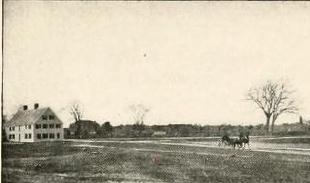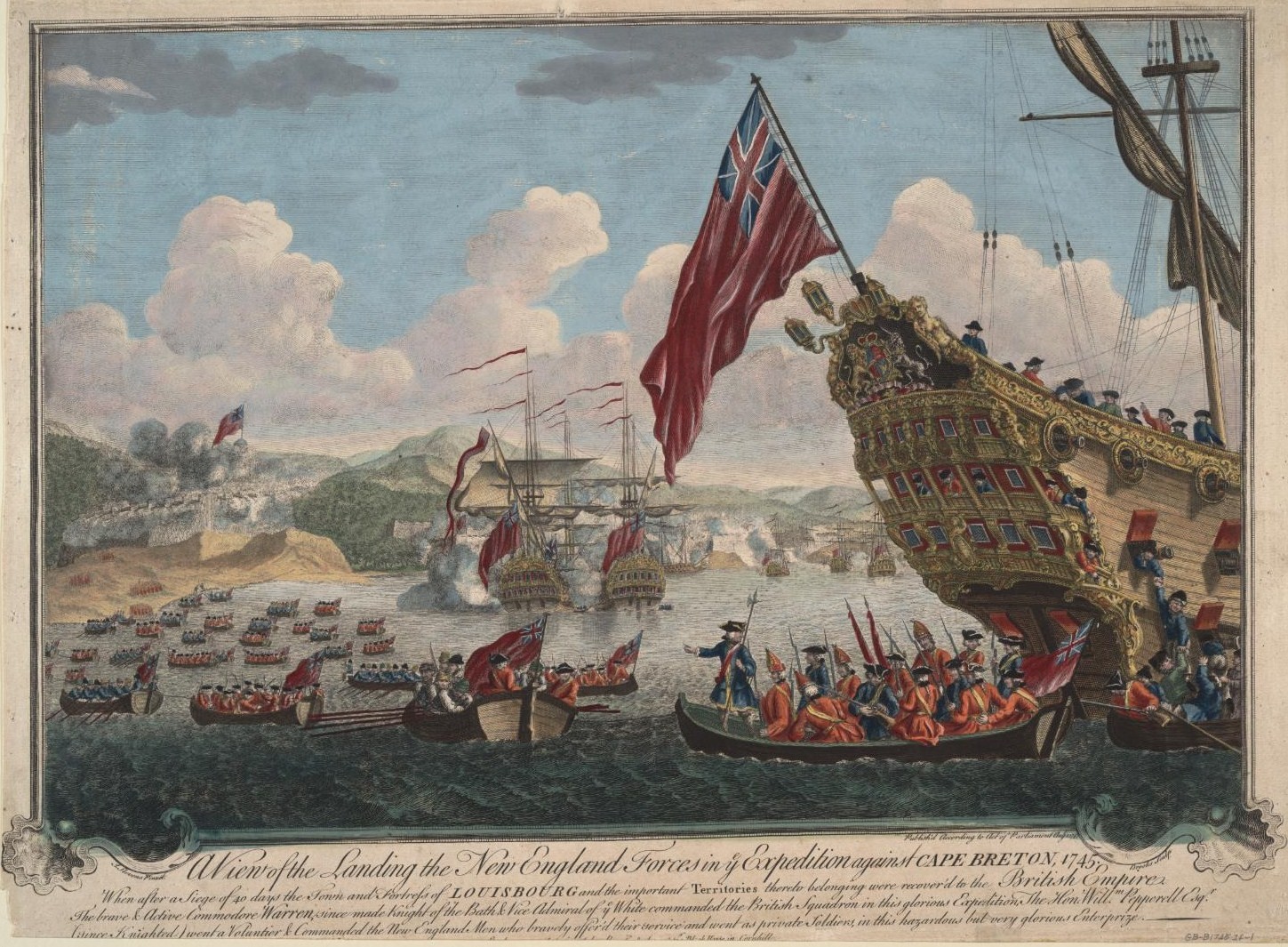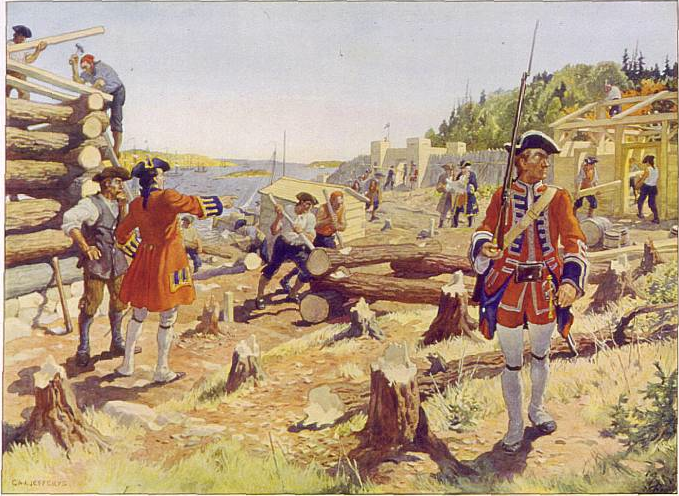|
Samuel Waldo (merchant)
Samuel Waldo (August 7, 1696 – May 23, 1759) was an American merchant, land speculator, army officer and politician in the Province of Massachusetts Bay. Biography He was born in Boston, the son of Jonathan Waldo and Hannah Mason. In 1722, he married Lucy Wainwright. In 1730, he purchased a 17th-century title to a large tract of land in Nova Scotia with the intent of establishing a colony there; the title did not stand up when he proposed this plan to the authorities in England. A one-time business partner of Colonel Thomas Westbrook, Waldo acquired a large tract of land between the Penobscot and Muscongus Rivers in what is now Maine where he settled Irish and German immigrants and purchased several slaves. During King George's War, he served as brigadier-general in the reduction on Louisbourg Fortress in 1745 and served on the temporary council that administered the settlement until Peter Warren was named governor. In 1757, during the French and Indian War, he submitted ... [...More Info...] [...Related Items...] OR: [Wikipedia] [Google] [Baidu] |
Robert Feke
Robert Feke ( 1705 or 1707 1752) was an American portrait painter born in Oyster Bay, Long Island, New York. According to art historian Richard Saunders, "Feke’s impact on the development of Colonial painting was substantial, and his pictures set a new standard by which the work of the next generation of aspiring Colonial artists was judged." In total, about 60 paintings by Feke survive, twelve of which are signed and dated. Life and career One of Robert Feke's grandmothers was Elizabeth Fones. Little is known for certain about his life, particularly his early years. Only one work by Feke, a portrait of a child, is datable before 1741.Saunders, Richard H. "Robert Feke". Oxford Art Online. Retrieved July 15, 2012 In that year he moved to Boston, where he painted ''Isaac Royall and Family'' (1741), a group portrait which borrows its composition from John Smybert’s ''The Bermuda Group'' (1729). Feke's works also show the influence of John Wollaston. From 1741 until 1750, Fek ... [...More Info...] [...Related Items...] OR: [Wikipedia] [Google] [Baidu] |
Colonel Thomas Westbrook
Colonel Thomas Westbrook (1675–1743/44) was a senior New England militia officer in Maine during Father Rale's War. In addition to this senior militia role he was a scout, a colonial councillor, an innkeeper, a mill owner, a land speculator and a King's Mast Agent. He is the namesake of Westbrook, Maine. Early years During Queen Anne's War, Westbrook became a ranger in a small company of four (1704). In 1716 the General Assembly of the Province made a grant to Thomas Westbrook, to keep the only public house at the Plains, in consideration that he should lay out six acres of land for the accommodation of drawing up the militia of the town. From at least 1720 he was the owner and proprietor. Father Rale's War During the years 1721-3 Westbrook became a captain in the militia and, after the fall of Colonel Shadrack Walton from favour with Massachusett's acting Governor William Dummer, became the colonel in charge of the militia in the "East" (Maine) A focus during ... [...More Info...] [...Related Items...] OR: [Wikipedia] [Google] [Baidu] |
Dictionary Of Canadian Biography Online
The ''Dictionary of Canadian Biography'' (''DCB''; french: Dictionnaire biographique du Canada) is a dictionary of biographical entries for individuals who have contributed to the history of Canada. The ''DCB'', which was initiated in 1959, is a collaboration between the University of Toronto and Laval University. Fifteen volumes have so far been published with more than 8,400 biographies of individuals who died or whose last known activity fell between the years 1000 and 1930. The entire print edition is online, along with some additional biographies to the year 2000. Establishment of the project The project was undertaken following a bequest to the University of Toronto from businessman, James Nicholson for the establishment of a Canadian version of the United Kingdom's '' Dictionary of National Biography''. In the spring of 1959, George Williams Brown was appointed general editor and the University of Toronto Press, which had been named publisher, sent out some 10,000 annou ... [...More Info...] [...Related Items...] OR: [Wikipedia] [Google] [Baidu] |
Thomas Pownall
Thomas Pownall (bapt. 4 September 1722 N.S. – 25 February 1805) was a British colonial official and politician. He was governor of the Province of Massachusetts Bay from 1757 to 1760, and afterwards sat in the House of Commons from 1767 to 1780. He travelled widely in the North American colonies prior to the American Revolutionary War, opposed Parliamentary attempts to tax the colonies, and was a minority advocate of colonial positions until the Revolution. Classically educated and well-connected to the colonial administration in London, Pownall first travelled to North America in 1753. He spent two years exploring the colonies before being appointed Lieutenant Governor of New Jersey in 1755. He became governor of Massachusetts in 1757 after helping engineer the recall of longtime Governor William Shirley. His administration was dominated by the French and Indian War (the Seven Years' War) in which Pownall was instrumental in raising Massachusetts provincial militia for t ... [...More Info...] [...Related Items...] OR: [Wikipedia] [Google] [Baidu] |
Apoplexy
Apoplexy () is rupture of an internal organ and the accompanying symptoms. The term formerly referred to what is now called a stroke. Nowadays, health care professionals do not use the term, but instead specify the anatomic location of the bleeding, such as cerebral, ovarian or pituitary. Informally or metaphorically, the term ''apoplexy'' is associated with being furious, especially as "apoplectic". Historical meaning From the late 14th to the late 19th century,''OED Online'', 2010, Oxford University Press. 7 February 2011 ''apoplexy'' referred to any sudden death that began with a sudden loss of consciousness, especially one in which the victim died within a matter of seconds after losing consciousness. The word ''apoplexy'' was sometimes used to refer to the symptom of sudden loss of consciousness immediately preceding death. Ruptured aortic aneurysms, and even heart attacks and strokes were referred to as apoplexy in the past, because before the advent of medical science, the ... [...More Info...] [...Related Items...] OR: [Wikipedia] [Google] [Baidu] |
Siege Of Louisbourg (1758)
The siege of Louisbourg was a pivotal operation of the Seven Years' War (known in the United States as the French and Indian War) in 1758 that ended the French colonial era in Atlantic Canada and led to the subsequent British campaign to capture Quebec in 1759 and the remainder of French North America the following year. Background The British government realized that with the Fortress of Louisbourg under French control, the Royal Navy could not sail up the St. Lawrence River unmolested for an attack on Quebec. After an expedition against Louisbourg in 1757 led by Lord Loudon was turned back due to a strong French naval deployment, the British under the leadership of William Pitt resolved to try again with new commanders. Pitt assigned the task of capturing the fortress to Major General Jeffery Amherst. Amherst's brigadiers were Charles Lawrence, James Wolfe and Edward Whitmore, and command of naval operations was assigned to Admiral Edward Boscawen. The chief engineer w ... [...More Info...] [...Related Items...] OR: [Wikipedia] [Google] [Baidu] |
William Pitt, 1st Earl Of Chatham
William Pitt, 1st Earl of Chatham, (15 November 170811 May 1778) was a British statesman of the Whig group who served as Prime Minister of Great Britain from 1766 to 1768. Historians call him Chatham or William Pitt the Elder to distinguish him from his son William Pitt the Younger, who was also a prime minister. Pitt was also known as the Great Commoner, because of his long-standing refusal to accept a title until 1766. Pitt was a member of the British cabinet and its informal leader from 1756 to 1761 (with a brief interlude in 1757), during the Seven Years' War (including the French and Indian War in the American colonies). He again led the ministry, holding the official title of Lord Privy Seal, between 1766 and 1768. Much of his power came from his brilliant oratory. He was out of power for most of his career and became well known for his attacks on the government, such as those on Walpole's corruption in the 1730s, Hanoverian subsidies in the 1740s, peace with France ... [...More Info...] [...Related Items...] OR: [Wikipedia] [Google] [Baidu] |
French And Indian War
The French and Indian War (1754–1763) was a theater of the Seven Years' War, which pitted the North American colonies of the British Empire against those of the French, each side being supported by various Native American tribes. At the start of the war, the French colonies had a population of roughly 60,000 settlers, compared with 2 million in the British colonies. The outnumbered French particularly depended on their native allies. Two years into the French and Indian War, in 1756, Great Britain declared war on France, beginning the worldwide Seven Years' War. Many view the French and Indian War as being merely the American theater of this conflict; however, in the United States the French and Indian War is viewed as a singular conflict which was not associated with any European war. French Canadians call it the ('War of the Conquest').: 1756–1763 The British colonists were supported at various times by the Iroquois, Catawba, and Cherokee tribes, and the French ... [...More Info...] [...Related Items...] OR: [Wikipedia] [Google] [Baidu] |
Peter Warren (Royal Navy Officer)
Vice-Admiral Sir Peter Warren, KB (10 March 1703 – 29 July 1752) was an Anglo-Irish naval officer and politician who sat in the British House of Commons representing the constituency of Westminster from 1747 to 1752. Warren is best known for his career in the Royal Navy, which he served in for thirty-six years and participated in numerous naval engagements, including most notably the capture of the French fortress of Louisbourg in 1745. Born in Ireland to an Irish Catholic family, Warren's parents raised him as a Protestant in order to allow him to pursue a career at sea. In 1716, Warren enlisted in the Royal Navy, largely spending the next decade serving off the West African coast or in the Caribbean, participating in anti-piracy operations and confrontations with Spanish coast guard vessels. Eleven years later in 1727, Warren was promoted to the rank of post-captain. From 1728 to 1745, Warren served almost continuously in the Americas. He commanded the '' Solebay'' off ... [...More Info...] [...Related Items...] OR: [Wikipedia] [Google] [Baidu] |
Fortress Of Louisbourg
The Fortress of Louisbourg (french: Forteresse de Louisbourg) is a National Historic Site and the location of a one-quarter partial reconstruction of an 18th-century French fortress at Louisbourg on Cape Breton Island, Nova Scotia. Its two sieges, especially that of 1758, were turning points in the Anglo-French struggle for what today is Canada. The original settlement was made in 1713, and initially called Havre à l'Anglois. Subsequently, the fishing port grew to become a major commercial port and a strongly defended fortress. The fortifications eventually surrounded the town. The walls were constructed mainly between 1720 and 1740. By the mid-1740s Louisbourg, named for Louis XIV of France, was one of the most extensive (and expensive) European fortifications constructed in North America. It was supported by two smaller garrisons on Île Royale located at present-day St. Peter's and Englishtown. The Fortress of Louisbourg suffered key weaknesses, since it was erected on ... [...More Info...] [...Related Items...] OR: [Wikipedia] [Google] [Baidu] |
Brigadier-general
Brigadier general or Brigade general is a military rank used in many countries. It is the lowest ranking general officer in some countries. The rank is usually above a colonel, and below a major general or divisional general. When appointed to a field command, a brigadier general is typically in command of a brigade consisting of around 4,000 troops (four battalions). Variants Brigadier general Brigadier general (Brig. Gen.) is a military rank used in many countries. It is the lowest ranking general officer in some countries, usually sitting between the ranks of colonel and major general. When appointed to a field command, a brigadier general is typically in command of a brigade consisting of around 4,000 troops (four battalions). In some countries, this rank is given the name of ''brigadier'', which is usually equivalent to ''brigadier general'' in the armies of nations that use the rank. The rank can be traced back to the militaries of Europe where a "brigadier general ... [...More Info...] [...Related Items...] OR: [Wikipedia] [Google] [Baidu] |
King George's War
King George's War (1744–1748) is the name given to the military operations in North America that formed part of the War of the Austrian Succession (1740–1748). It was the third of the four French and Indian Wars. It took place primarily in the British provinces of New York, Massachusetts Bay (which included Maine as well as Massachusetts at the time), New Hampshire (which included Vermont at the time), and Nova Scotia. Its most significant action was an expedition organized by Massachusetts Governor William Shirley that besieged and ultimately captured the French fortress of Louisbourg, on Cape Breton Island in Nova Scotia, in 1745. In French, it is known as the ''Troisième Guerre Intercoloniale'' or Third Intercolonial War. The Treaty of Aix-la-Chapelle ended the war in 1748 and restored Louisbourg to France, but failed to resolve any outstanding territorial issues. Causes The War of Jenkins' Ear (named for a 1731 incident in which a Spanish commander sliced off the ea ... [...More Info...] [...Related Items...] OR: [Wikipedia] [Google] [Baidu] |









